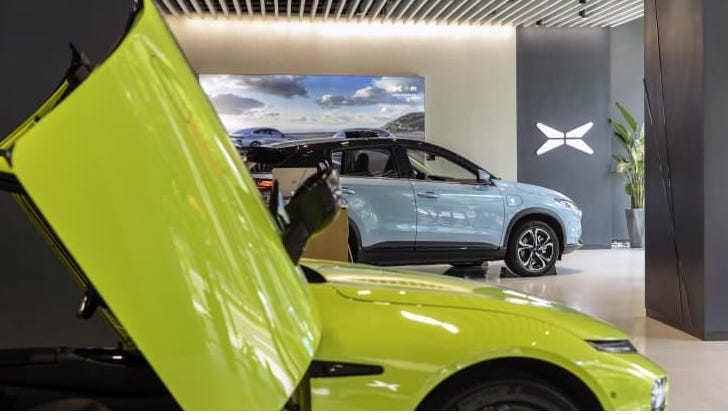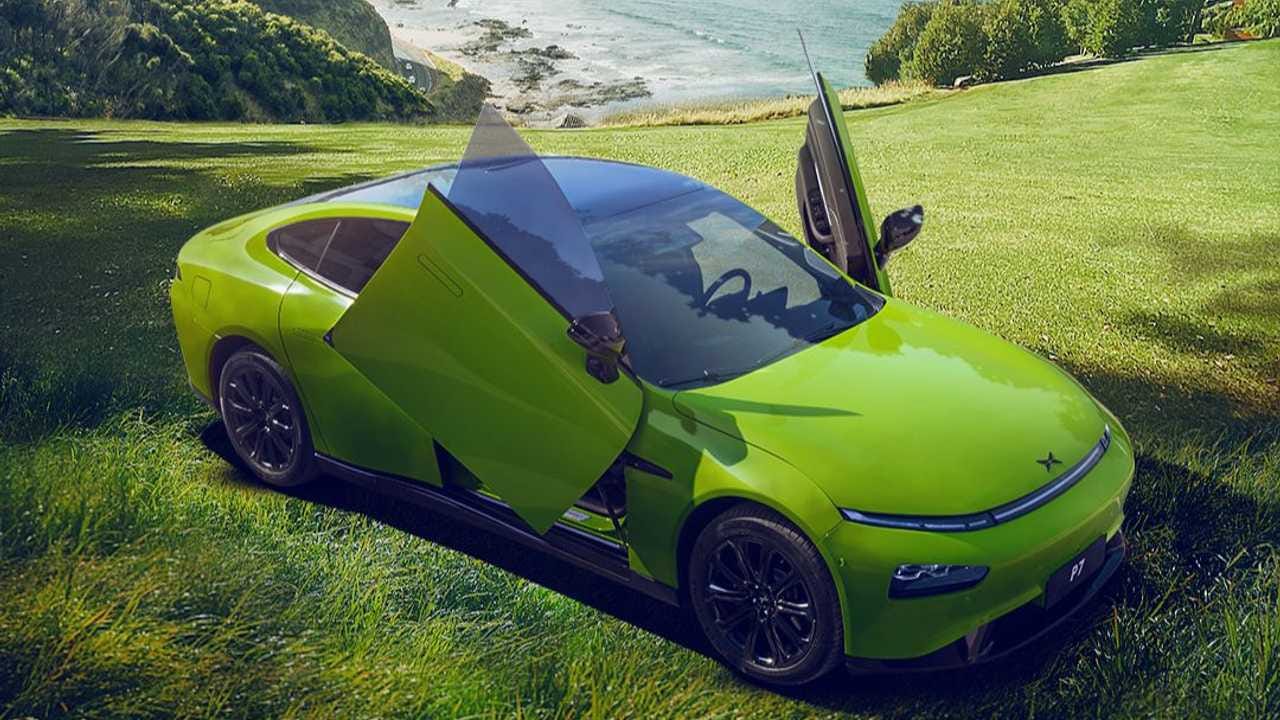Alibaba teams up with Tesla rival Xpeng
On Tech for Self-driving cars. Alibaba is a major investor in Xpeng.
I have a special discount to reward my early backers during my first year of Substack. For a review of my content on this Newsletter, check my archives.
Hey Guys,
There are many Substacks that provide great info on China in geopolitical, policy and even investing basis. But there are few good ones about China Technology. I aspire to be one of those.
In terms of accountability journalism, I don’t prescribe to nationalism or the propaganda of either side in the East/West Axis cold-tech war. While I’m a critic by nature, for China I want to actually focus on their innovation, development, startup scene and how their companies will scale globally.
As you know I’m pretty bullish on China’s technology scaling well into the 2030s. For the time being among China’s many EV startups I consider Xpeng superior to Nio and others. It’s mostly to do with its venture capital support and relentless spirit of innovation.
So let’s get into it:
People don’t realize of course what China’s EV and self-driving sector will become globally in the next two decades. While I’m bearish on Tesla I’m bullish on the competition, this is due to how first-mover advantages disappear very quickly in global markets where China is key.
So what are we talking about here?
Chinese e-commerce giant Alibaba and electric vehicle startup Xpeng are opening a computing center to train software for driverless cars, the two companies said Tuesday August 2nd, 2022.
On August 1st we got some more details about Xpeng’s EV deliveries. Xpeng recorded monthly deliveries in July of 11,524 Smart EVs, representing a 43% increase year-over-year. The Company delivered 80,507 Smart EVs in total for the first seven months in 2022, representing a 108% increase year-over-year, ranking No. 1 among emerging auto brands in China.
As consolidation occurs in China’s EV sector, the best of those will go global. Xpeng has a 20% chance of becoming not just a technology company, but a robotics company as well - as is the trend of Hyundai to Tesla. Global competition will eventually bring out the superiority of China’s venture capital model and Government backing with long-term vision strategy. This is no Softbank gambling, this is meticulous. This is a different kind of beast.
Alibaba Cloud will also be a beneficiary. Think about it, Xpeng will use technology from Alibaba’s cloud division for its computing needs.
For Xpeng, the move marks its ambitions to pull ahead in the fiercely competitive electric vehicle market in China and attempt to challenge giants Tesla and Warren Buffett-backed BYD.
Alibaba, an investor in Xpeng, has been trying to bolster its cloud computing division amid a slowdown in its core commerce business.
The west doesn’t understand what it’s even up against. There’s so much misinformation online about innovation and the EV sector.
Xpeng flying car
XPeng's HT Aero has already shared video footage testing the X2 in extreme environments and high altitudes as it works toward delivering its sixth-generation model. This actual flying car was unveiled this past October and is scheduled to arrive in 2024 and only cost about $155,000.
I cannot describe to you easily what’s coming. Nor why it is born in China. Suffice to say the Chinese long-term strategy with regards to innovation, A.I., smart cities and robotics will be a leader.
I don’t need to do PR on this, as a futurist I’ve known this for years. Tesla’s idea of consumer robotics isn’t industry-leading, it’s copying China.
XPeng is still focused in boosting the sales of its electric cars. But it has been focusing on building out future businesses in flying cars and robotics. This is nothing new for China’s over-reaching strategy.
How China funds companies and creates collaboration among its technology leaders is much more sophisticated in its Neo Surveillance Capitalism. It’s widely misunderstood. That China is a first mover in funding quantum computing for instance, is not by accident. China’s state-backed Capitalism is fundamentally a different paradigm.
I will be covering Alibaba’s Q2 earnings tomorrow, and we know basically what to expect. However the BAT companies are huge BigTech companies that have and are funding the future startups of tomorrow in China. In July, 2022 Xiaopeng Motors, an electric vehicle maker based in China, said it secured a Series C+ round of financing of approximately $500 million.
Remember, Alibaba Group backed Xpeng in a $314.8 million Series B+ round in 2018. This is the main reason why I’m most bullish about XPEV 0.00%↑ fate and future fortunes.
How Silicon Valley’s BigTech companies fund innovation in the U.S. is at least a decade behind in how BAT companies (Baidu, Alibaba and Tencent) have funded China’s ecosystem. It’s a more efficient venture capital system, combined with more Government intervention, steering and long-term backing.
Autonomous driving systems require huge amounts of data to be processed in order to train algorithms.
Xpeng claims that the new computing center will reduce the training time for its core autonomous driving model from seven days to within an hour.
Apple and Baidu are going after the software of the future of the smart car.
How companies like Xpeng scale are important to China’s brand image of the future as a technology leader. The Guangzhou-headquartered company will use technology from Alibaba’s cloud division for its computing needs. The computing center called Fuyao will be located in the region of Inner Mongolia in northern China.
If the U.S. has just a small handful of EV startups that are legit, China has dozens if not hundreds. It’s a very different scale and consideration of a larger more important market. Even as Lucid and Rivian could in theory face bankruptcy due to the harsh supply-chain environment bleeding cash, China won’t let its best startups die a horrible fate. If it did, Nio itself would have died many times. I was an early investor in Nio. But as time went on, I have more faith in Xpeng.
According to CNBC, Alibaba, an investor in Xpeng, has been trying to bolster its cloud computing division amid a slowdown in its core commerce business. The move also highlights how China’s technology giants are trying to jump into the fast-growing electric vehicle space.
Xpeng, founded in 2014, is just another one of the many EV startups in China. Few understand what it will become. As Alibaba’s growth curve slows in impossible conditions, Xpeng is just getting started. China won’t eventually allow Tesla to remain in China in my humble opinion. Apple pays a lot of money to be allowed to have such a huge presence in China. It’s not a deal that’s easily understood by the media.
With BYD, Nio and others it’s truly fascinating to witness competition in China’s EV sector. You may know that Tencent, for example, is trying to position itself as the go-to technology company for foreign automakers to use for various automotive technology-related services when they enter the Chinese market.
Back in 2020, China’s electric vehicle market, included more than 400 automobile makers. In the Fall of 2021: The electric vehicle sector is currently seeing a “most exciting moment,” according to Bain & Company’s Helen Liu. But the best is yet to come for China’s new breed of EV and robotics makers. We’ve been so force-fed a Tesla-centric narrative (by American billionaires) we don’t even understand the future or why China is so important.
China’s electric vehicle startups from Nio to Xpeng see autonomous driving features as a way to compete with the BYD and Teslas of the world in China. The talent and ability to pivot of these formative startups breeds a culture of innovation for the future of China that I believe might scale to other industries.
As far flawed as Tesla’s FSD is, Xpeng has an advanced driver-assistance system, or ADAS, called XPILOT installed in some of its vehicles. Users who opt for this feature can get some autonomous features such as automatic lane switching.
The Magic of Future Robotics and Smart Cars
The car manufacturing companies that marry EV and self-driving the best have a competitive advantage. Last year, Xpeng launched the City NGP, which stands for navigation guided pilot. The system allows Xpeng’s cars to change lanes, speed up or slow down, or overtake cars and enter and exit highways. Previously the system was designed just for highways, but it has now been designed for cities too.
So why would lowly EV startups pretend to be Tesla-esque technology companies and do all this weird R&D bleeding VC money? Xpeng has tried to position itself more like a technology company rather than an automaker and has been investing in areas such as robotics and flying passenger drones. Nio has any number of similar publicity stunts. They all seek to replicate Tesla’s weird brand persona and customer loyalty. It’s not clear if they will be able to mimic it, even as it seems doubtful Lucid can become the “Apple” of EVs.
There’s a point probably around 2035, when China’s car manufacturers begin to take global leadership, and it’s somewhat inevitable.
Until then we can admire Tesla, wonder about Apple and observe what BYD, Baidu and others do. Many EV startups won’t make it to the finish line. Xpeng could certainly be acquired by Alibaba one day, anything could happen.
China is Leading the Robo-Taxi Race
Chinese regulators have, for the most part, been quite encouraging of autonomous driving technology. Various cities across the country have allowed domestic driverless car firms to test and even launch robotaxi services too.
China has more EV players and more consumers, although how they will grow globally remains a bit question mark. Nio has been entering Europe for quite some time. From consumer robotics to A.I. products, China has an immense advantage in terms of data, a large consumer market and many other factors that give it economic advantages over the companies of other countries.
The downfall of Elon Musk to some extent is preordained. Even the shorts that have lost $Billion on Tesla’s stock price are not terribly wrong, they just are bad at timing it.
Thanks for reading!





